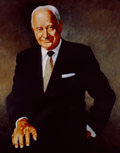Conrad N. Hilton
Founder of Hilton Hotels
 AAs the product of a Norwegian-immigrant father and a German-American mother, Conrad N. Hilton had a strong belief in the American dream. He realized that dream by building a global empire that has seen continued success decades after his death, as well as giving back to the community and to higher education. His philosophy for success was derived from his faith in God, his belief in the brotherhood of man, his patriotic confidence in the United States of America, and his conviction that all mankind is obliged to help relieve the suffering, the distressed and the destitute. AAs the product of a Norwegian-immigrant father and a German-American mother, Conrad N. Hilton had a strong belief in the American dream. He realized that dream by building a global empire that has seen continued success decades after his death, as well as giving back to the community and to higher education. His philosophy for success was derived from his faith in God, his belief in the brotherhood of man, his patriotic confidence in the United States of America, and his conviction that all mankind is obliged to help relieve the suffering, the distressed and the destitute. Hilton was educated at St. Michael’s College in Santa Fe, New Mexico, and the New Mexico School of Mines. In 1919, he entered the hotel business when he bought the Mobley Hotel in Cisco, Texas. He built his first hotel, the Dallas Hilton, in 1925. While the Dallas Hilton was being built, Hilton married Mary Barron, with whom he had three children—Conrad N. Jr., William Barron and Eric Michael. He later had a fourth child, Francesca, with his second marriage to Zsa Zsa Gabor. During the Great Depression, Hilton learned to operate with economy—one of the keys to his future success—and was able to expand his empire by purchasing hotels throughout the United States, including the legendary Waldorf=Astoria Hotel in New York City, The Stevens, currently known as the Chicago Hilton & Towers, the Sir Francis Drake in San Francisco, The Plaza in New York City and the Palmer House in Chicago. Furthermore, he developed his business internationally by building hotels outside the United States in such exotic locales as San Juan, Madrid, Istanbul, Havana, Berlin and Cairo. Hilton staunchly believed in world peace and global economic stability, and used corporate advertising to promote “World peace through international travel and trade.” To support his values and concern for the public, he founded the Conrad N. Hilton Foundation in 1944. The legacy of Conrad N. Hilton lives on through the Conrad N. Hilton Foundation, which supports many religious, educational and non-profit medical organizations, and was instrumental in the founding of the Mayo Clinic in 1972. The Foundation has supported a multitude of causes, including addiction and substance abuse, brain research, water development in Africa, ending homelessness, preventing blindness and stopping domestic violence. In 1969, Hilton pledged $1.5 million toward the construction of the college that now bears his name, the Conrad N. Hilton College of Global Hospitality Leadership at the University of Houston. Today, the College is one of the top hospitality programs in the world. |